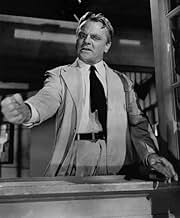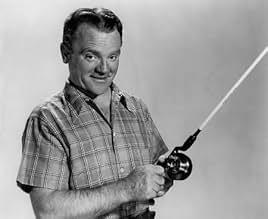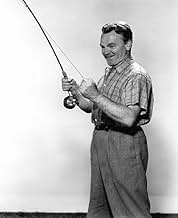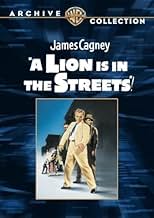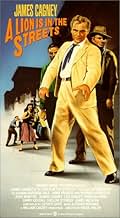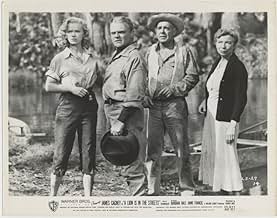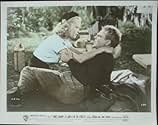NOTE IMDb
6,1/10
1,1 k
MA NOTE
Ajouter une intrigue dans votre langueA charismatic peddler from the bayous finds his true calling in politics. Is he a demagogue in the making?A charismatic peddler from the bayous finds his true calling in politics. Is he a demagogue in the making?A charismatic peddler from the bayous finds his true calling in politics. Is he a demagogue in the making?
- Réalisation
- Scénario
- Casting principal
Lon Chaney Jr.
- Spurge McManamee
- (as Lon Chaney)
Lee Aaker
- Johnny Briscoe
- (non crédité)
Victor Adamson
- Townsman
- (non crédité)
Carl Andre
- Townsman
- (non crédité)
Nadine Ashdown
- Minor Role
- (non crédité)
Avis à la une
... that is basically a poor man's "All The King's Men". I can't remember ever giving a James Cagney film less than a 6/10, if only because of James Cagney. This would probably get a 3 or 4 without him.
There's no chance for any of the cast to do any real character development as you jump from scene to scene. Cagney's Hank Martin is a bayou peddler who aspires to political office claiming to be a man of the people. He makes goofy moves considering he is an aspiring politician, with his rise to fame based on one scandal that Hank uncovers and a murder that results. Cagney assumes it is cotton gin owner and merchant Castleberry behind everything, but by the end of the film when I was told who was actually behind it, I just went WHO? And had to back up into the film to even see who this person was. And you haven't lived until you've seen a dead man -actually sitting in the courtroom - tried for murder.
Barbara Hale plays Hank's school marm wife. Ann Francis plays a bayou girl with a crush on Cagney who first tries to feed Hale to the alligators to get rid of her, then just pushes Hank - she doesn't have to push hard - until he relents and begins cheating on his wife with her. One interesting thing here - Frank McHugh as a malicious person. You don't see that very often. And I have no idea why a hound dog sleeping at the foot of the Lincoln Memorial has anything to do with this story, symbolically or otherwise.
I'd suggest it for Cagney completists and probably nobody else.
There's no chance for any of the cast to do any real character development as you jump from scene to scene. Cagney's Hank Martin is a bayou peddler who aspires to political office claiming to be a man of the people. He makes goofy moves considering he is an aspiring politician, with his rise to fame based on one scandal that Hank uncovers and a murder that results. Cagney assumes it is cotton gin owner and merchant Castleberry behind everything, but by the end of the film when I was told who was actually behind it, I just went WHO? And had to back up into the film to even see who this person was. And you haven't lived until you've seen a dead man -actually sitting in the courtroom - tried for murder.
Barbara Hale plays Hank's school marm wife. Ann Francis plays a bayou girl with a crush on Cagney who first tries to feed Hale to the alligators to get rid of her, then just pushes Hank - she doesn't have to push hard - until he relents and begins cheating on his wife with her. One interesting thing here - Frank McHugh as a malicious person. You don't see that very often. And I have no idea why a hound dog sleeping at the foot of the Lincoln Memorial has anything to do with this story, symbolically or otherwise.
I'd suggest it for Cagney completists and probably nobody else.
It's unfortunate that A Lion Is In the Streets came out after All the King's Men. Both films were based in part on the legend of Huey Long. I think All the King's Men is better, but A Lion Is in the Streets has its moments.
For one thing it has the dynamic presence of James Cagney. You would hardly think that the very urban Mr. Cagney could pull off the role of a southern demagogue, but pull it off he does. It's the story of a man who is an itinerant peddler with a good gift of gab. You like him in those first few minutes of the film as the peddler takes shelter in Barbara Hale's one room schoolhouse. But as he discovers his gift for demagoguery he fascinates and repels the viewer as much as he enthralls the crowds in the film.
For another since our protagonist doesn't quite get to the heights that Broderick Crawford did in All the King's Men, it instead concentrates more on the man's humble beginnings. Instead of being a farmer who was educated by his wife as Broderick Crawford was in All the King's Men, the real Huey Long in fact was an itinerant peddler who was educated by his wife Rose McConnell Long. In fact Huey, Rose, and Russell are the answer to a trivia question as being the only parents and child who served in the United States Senate. Rose was given a temporary appointment to his seat following Long's assassination and son Russell had a considerable career in the Senate himself.
Barbara Hale's role is pretty modest, but that's how Rose McConnell was in real life. In their marriage she put up with quite a lot from Huey.
James Cagney produced this one himself with brother William Cagney taking on the administrative responsibilities and both of them giving little sister Jeanne Cagney her career role. She's the wife of luckless sharecropper John McIntire whose death Cagney demagogues for all its worth. The scene with the dying McIntire in court will chill you with fright. Jeanne is a true believer in Cagney the man and it's her disillusionment with him that leads to the shattering climax.
Other good performances in the cast are Anne Francis as bayou mantrap Flamingo, Larry Keating as the stuffed shirt that Cagney attacks for his own ends, and Lon Chaney, Jr. who is Francis's stern father.
It's not as good as All the King's Men, but A Lion is in the Streets has a lot to recommend it.
For one thing it has the dynamic presence of James Cagney. You would hardly think that the very urban Mr. Cagney could pull off the role of a southern demagogue, but pull it off he does. It's the story of a man who is an itinerant peddler with a good gift of gab. You like him in those first few minutes of the film as the peddler takes shelter in Barbara Hale's one room schoolhouse. But as he discovers his gift for demagoguery he fascinates and repels the viewer as much as he enthralls the crowds in the film.
For another since our protagonist doesn't quite get to the heights that Broderick Crawford did in All the King's Men, it instead concentrates more on the man's humble beginnings. Instead of being a farmer who was educated by his wife as Broderick Crawford was in All the King's Men, the real Huey Long in fact was an itinerant peddler who was educated by his wife Rose McConnell Long. In fact Huey, Rose, and Russell are the answer to a trivia question as being the only parents and child who served in the United States Senate. Rose was given a temporary appointment to his seat following Long's assassination and son Russell had a considerable career in the Senate himself.
Barbara Hale's role is pretty modest, but that's how Rose McConnell was in real life. In their marriage she put up with quite a lot from Huey.
James Cagney produced this one himself with brother William Cagney taking on the administrative responsibilities and both of them giving little sister Jeanne Cagney her career role. She's the wife of luckless sharecropper John McIntire whose death Cagney demagogues for all its worth. The scene with the dying McIntire in court will chill you with fright. Jeanne is a true believer in Cagney the man and it's her disillusionment with him that leads to the shattering climax.
Other good performances in the cast are Anne Francis as bayou mantrap Flamingo, Larry Keating as the stuffed shirt that Cagney attacks for his own ends, and Lon Chaney, Jr. who is Francis's stern father.
It's not as good as All the King's Men, but A Lion is in the Streets has a lot to recommend it.
Cagney (clever & aggressive) is seen peddling his wares in the back-hills country of a cotton-growing southern state... He falls for beautiful Barbara Hale, a sympathetic grade-school teacher from up North... They wed and honeymoon in a small house supplied by aristocratic Warner Anderson...
Watchful to the possibilities of a political career in which he could easily become the governor of the state, Cagney increases his interest in a blonde tramp called Flamingo (Anne Francis), a violent and turbulent woman, who in a fit of jealousy nearly gets rid of her competitor (Barbara Hale) in a premeditated swamp accident...
Barbara Hale is sweet, charming and understanding, but she has the least showy role in a film full to the disintegrating point with well-delineated colorful characters performed by a very experienced cast...
Raoul Walsh's direction keeps the film moving lively and Harry Stradling's excellent Technicolor photography captures the very atmosphere of the deep South...
Watchful to the possibilities of a political career in which he could easily become the governor of the state, Cagney increases his interest in a blonde tramp called Flamingo (Anne Francis), a violent and turbulent woman, who in a fit of jealousy nearly gets rid of her competitor (Barbara Hale) in a premeditated swamp accident...
Barbara Hale is sweet, charming and understanding, but she has the least showy role in a film full to the disintegrating point with well-delineated colorful characters performed by a very experienced cast...
Raoul Walsh's direction keeps the film moving lively and Harry Stradling's excellent Technicolor photography captures the very atmosphere of the deep South...
As a serious study of a corrupt demagogue this film is clearly useless. There are simply too many ludicrous scenes. Let's list two, shall we? First there's the one where the demagogue's mistress attempts to feed his wife to the gators (yeah, you read that right) only to have the wife decide, when the attempt fails, not to rat her out. Then there's that trial scene where we are asked to believe that a judge, even a crooked one, would allow a man who is bleeding to death from multiple gunshot wounds to take the stand. As a biopic of Huey Long this film also falls short, mostly due to Cagney, with his pathetically inept try at a cracker accent and being ten, no make that twenty, years too old for the part coming in a distant second to Broderick Crawford who deservedly picked up the Oscar for "All The King's Men". However, (and it's this "however" that makes "Lion" a fairly good movie) as a study of mob violence and the suddenness of its onset and the scariness of its furor director Raoul Walsh and scenarist Luther Davis are not only on firmer ground than in their attempts to show how power corrupts but they are on strong prophetic ground as well with the scenes of Cagney, (who was born in Manhattan), refusing to concede, inciting a riot and exhorting his rioters to march on the state capitol, all eerily reminiscent of the behavior of another native New Yorker on Jan. 6, 2021. At this point, roughly the last third of the film, I became mesmerized. Give it a B minus. PS...The only performance that stood out for me was Onslow Stevens as a Southern version of Edward Arnold in "Mr Smith". Haven't really seen much of this actor's work, a condition I hope to rectify.
I guess Cagney took the "lion" part literally since he roars all the way through. Unfortunately, it does get tiresome. That along with a brash behavior competes with plot development muddying overall impact. Perhaps Cagney saw a need to out-bluster award winning Broderick Crawford in 1950's thematically similar All The King's Men. Don't get me wrong-I'm a long time Cagney fan, but his turn here amounts almost to a caricature of his usual dynamic persona.
The movie itself lacks impact, mainly because of a screenplay that fails to concentrate Hank's (Cagney) trickery into a central focus. Instead, the story veers around in rather murky fashion, particularly with the political conniving that leads to Hank's downfall. For example, see if you can sort out the Castleberry, Polli, Beach, Rector, roles leading to Hank's downfall. Or figure out the clumsily developed Jeb Brown legal proceedings. To me, the script badly needed a re-write. Also, the casting of the women's roles requires a stretch. Hale's Verity appears much too refined for loud-mouth Hank, while Francis's Flamingo(!) appears about 20-years too young. These appear aimed at reinforcing Hank's blustery charisma. Anyway, I did like the 'one for all' bonding of the sharecroppers, especially when they transform Hank's shack into a bright bungalow. Also, the way the gin mill cheats is enlightening and I expect really happened to cotton growers. So there are compensations. However, the movie itself strikes me as one of Cagney's lessers and shows why it's seldom included in his iconic canon.
The movie itself lacks impact, mainly because of a screenplay that fails to concentrate Hank's (Cagney) trickery into a central focus. Instead, the story veers around in rather murky fashion, particularly with the political conniving that leads to Hank's downfall. For example, see if you can sort out the Castleberry, Polli, Beach, Rector, roles leading to Hank's downfall. Or figure out the clumsily developed Jeb Brown legal proceedings. To me, the script badly needed a re-write. Also, the casting of the women's roles requires a stretch. Hale's Verity appears much too refined for loud-mouth Hank, while Francis's Flamingo(!) appears about 20-years too young. These appear aimed at reinforcing Hank's blustery charisma. Anyway, I did like the 'one for all' bonding of the sharecroppers, especially when they transform Hank's shack into a bright bungalow. Also, the way the gin mill cheats is enlightening and I expect really happened to cotton growers. So there are compensations. However, the movie itself strikes me as one of Cagney's lessers and shows why it's seldom included in his iconic canon.
Le saviez-vous
- AnecdotesEleventh and final time that James Cagney co-starred with his close friend Frank McHugh, the first time being La foule hurle (1932).
- Gaffes(at around 15 mins) Hank and Verity are walking towards Mr. Castleberry's mansion, a boom mic shadow can be seen moving in front of them, going from the top to the middle of the screen.
- Citations
Verity Wade: It's these folks. They're all so wonderful.
Hank Martin: Well, all folks is wonderful. You just have to know the right place to kick 'em in.
Verity Wade: What?
Hank Martin: Sure. It's like learnin' to play a musical instrument by ear. All you gotta know is what place to push to get what note. Then pretty soon, everybody's dancin'...to your tune.
- Versions alternativesThe most commonly shown television version was very extensively cut (over 20 minutes) for time, mainly in the second half, to the point where the plot is very hard to follow.
Meilleurs choix
Connectez-vous pour évaluer et suivre la liste de favoris afin de recevoir des recommandations personnalisées
- How long is A Lion Is in the Streets?Alimenté par Alexa
Détails
- Durée1 heure 28 minutes
- Rapport de forme
- 1.37 : 1
Contribuer à cette page
Suggérer une modification ou ajouter du contenu manquant

Lacune principale
By what name was Un lion dans les rues (1953) officially released in India in English?
Répondre
